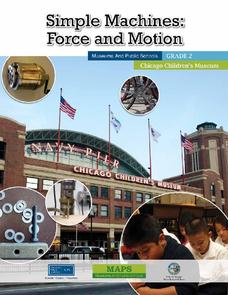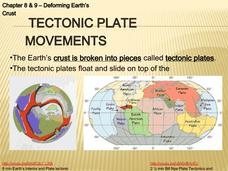Normal Community High School
Scientific Measurement
Pupils learn everything from how to take scientific measurements, to accuracy/precision, to density and a plethora of topics from a presentation on the metric system.
Scholastic
Study Jams! Weather Instruments
Concise, yet complete, this set of seven slides describes with photos and text the different basic instruments for measuring weather factors. After viewing, young meteorologists will be able to talk about how to measure humidity, wind...
Curated OER
The Global Precipitation Measurement Mission (GPM) Lesson
Introduce your class to one of the ways that technology is benefiting humanity. The Global Precipitation Measurement Mission involves the data collected by nine satellites from different countries with a united focus on studying world...
Curated OER
Rhythm Jam
Groups create, memorize, and perform for the class a 4 beats per measure rhythm pattern using percussion instruments including xylophones, rhythm sticks, and drums. The pattern is recorded on the worksheet provided in the resource.
Core Knowledge Foundation
Weather or Not, Seasons Change
Embark on a year long investigation of the seasons with this 10-lesson earth science unit. After being introduced to different types of weather and the tools used to measure it, young scientists perform fun hands-on activities that teach...
Teach Engineering
Weather Basics
Weather — there's more to it than meets the eye of the storm. With this resource young meteorologists learn about the basics of weather, including information about the factors that influence the weather, common weather vocabulary, and...
NASA
Write the Book on Weather Metrics
It's not easy to measure the weather. Pupils learn about what all weather has in common—the atmosphere. Scholars discover how a meteorologists must be able to measure aspects of the atmosphere and decipher the data. They then create a...
Union County Vocational Technical Schools
Engineering Drawing
Knowing the basics of drafting allows individuals to create drawings that show all the views and measurements necessary to allow others to visualize the original object. Pupils gain experience by drawing three orthographic views of an...
Teach Engineering
Stormy Skies
Young meteorologists examine the four main types of weather fronts and how they appear on a weather map. Participants learn about the difference between the types of weather fronts along with their distinguishing features. A...
Leadership Challenge
Student Appreciation: Nurturing and Developing
How can the growth of leadership qualities be measured? Make the development of leadership behaviors visual! Class members periodically recognize the leadership behaviors of their peers by adding color-coded sand to a jar labeled with...
Virginia Department of Education
Atomic Structure: Periodic Table
The fifth lesson of seven in the series outlines an in-depth analysis of the periodic table. After direct instruction, pupils take turns practicing in the group before beginning independent study. The assessments include a quiz and an...
Polar Trec
Playground Profiling—Topographic Profile Mapping
The Kuril islands stretch from Japan to Russia, and the ongoing dispute about their jurisdiction prevents many scientific research studies. Scholars learn to create a topographic profile of a specific area around their schools. Then they...
Chicago Children's Museum
Simple Machines: Force and Motion
Get things moving with this elementary science unit on simple machines. Through a series of nine lessons including teacher demonstrations, hands-on activities, and science experiments, young scientists learn about forces, motion, and...
Discovery Education
Sonar & Echolocation
A well-designed, comprehensive, and attractive slide show supports direct instruction on how sonar and echolocation work. Contained within the slides are links to interactive websites and instructions for using apps on a mobile device to...
Science 4 Inquiry
Musical Vibes with Palm Pipes
Ancient people used musical pipes as early as the third millennium BCE. Young scientists explore the workings of musical pipes to better understand the relationship with frequency, length of pipe, and sound waves. They determine the...
K12 Reader
The Pitch and Volume of Sound
Primary graders are introduced to the concepts of pitch and volume with a reading comprehension learning exercise that focuses on the physics of sound.
Teach Engineering
Air Under Pressure
Introduce your class to air masses and how they affect the weather with a activity that focuses on the differences between high and low air pressure systems. The class explores actual weather data using archived weather data.
Curated OER
Understanding Weather
A succinct set of slides covers the main points for your weather unit. From the factors that contribute to conditions, to fronts and extreme occurrences, to the different types of clouds, numerous facts are listed in bullets. The only...
Chicago Botanic Garden
Weather or Not
What is the difference between weather and climate? This is the focus question of a lesson that takes a deeper look at how weather data helps determine climate in a region. Using weather and climate cards, students decide if a statement...
K12 Reader
Absolute Location
Where in the world are we? As a reading comprehension exercise, kids read a short passage about navigation using latitude and longitude, and then respond to a series of questions based on the article.
K12 Reader
Meteorologists
Meteorologists and the tools they use are the subject of a reading comprehension instructional activity that asks kids to read the attached article and respond to a series of comprehension questions.
Curated OER
Deforming Earth's Crust
A short and straightforward slideshow presentation is a great addition to your lesson on plate tectonics. With demonstrative diagrams and helpful facts, the presentation helps to reinforce a concept that can be a little tricky for...
Classics for Kids
"Mars" from The Planets
Gustav Holst's The Planets provide young musicians an opportunity to examine how composers can create a suite: a collection of smaller pieces grouped to explore a single topic. After listening to "Jupiter," they examine "Mars" in detail,...
American Chemical Society
The Energy Efficiency of Heating Water
Can a small change in laboratory procedures save energy? Scholars test three different methods for heating water in a science lab. Then, they calculate the energy efficiency for each and compare them to determine which uses the least...

























